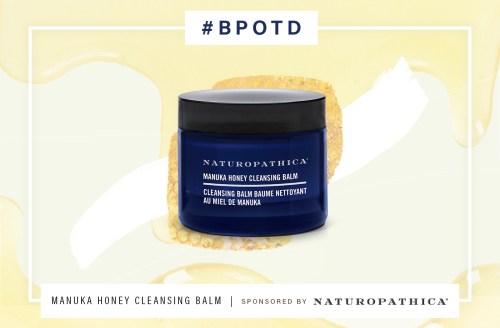advertisement
#BPOTD: This balm combines Manuka honey and probiotics for the ultimate natural face-washing experience
Here's what happened when an editor tried the microbiome-balancing Manuka Honey Cleansing Balm, which is packed with probiotics and antimicrobial ingredients.

Optimizing my gut health is pretty much my main goal in life (see: the army of supplement bottles on my desk), so my internal microbiome is something I’m super familiar with. My skin microbiome? Not so much.
Truth be told, I didn’t know I even had a microbiome anywhere but my gut until recently, so the news that I was supposed to be putting probiotics on my face (not just popping them in pill form) came as a surprise.
But according to Naturopathica founder and CEO Barbara Close, by neglecting the bacteria on my skin I might be missing out on some major complexion-boosting benefits (oops).
“Like the gut, your skin has its own microbiome, [with] billions of bacteria, both good and bad,” says Close. “A balanced skin microbiome protects against acne, irritation, and premature aging. Think of it as your skin’s first line of defense that needs to be nurtured.”
“A balanced skin microbiome protects against acne, irritation, and premature aging.”
In the name of my obsession with all things good-bacteria, I adopted Naturopathica’s Manuka Honey Cleansing Balm into my daily routine. The balm uses the probiotic strain Lactobacillus Ferment Lysate Filtrate and anti-microbial Manuka honey to achieve the ideal balance of bacteria.
If you’re freaked out that a Manuka honey cleanser will just be a gross sticky mess, I’m happy to report that the sweetly scented balm (ahh, honey) has a luxe, silky texture that melts right into your skin—taking your nighttime ritual from a must-do chore to a totally sensorial experience.
The almond-oil-based formula is designed to cut through sebum and oily products like sunscreen, makeup, and moisturizers that water-based cleansers have trouble breaking down—which is why you’re supposed to apply the balm to dry skin and then add water.
“Because this is an oil-based product, water creates a physical barrier between the skin and the balm,” Close explains. “Use the balm first, then rinse with warm water and a moist towel.” Check, and check.
Reversing the order of my usual face-washing process meant fewer soapy suds than I was accustomed to, which Close says is actually a good thing because most people actually over-cleanse their skin.
“We’ve been conditioned to believe that harsh, foaming cleansers are good, but the practice of stripping the beneficial oils from the skin creates a whole host of problems.”
“We’ve been conditioned to believe that harsh, foaming cleansers are good, but the practice of stripping the beneficial oils from the skin creates a whole host of problems as the skin tries to correct itself,” she says. “Gently removing dirt and product buildup while strengthening the skin barrier is the most important step in a skin care regimen.”
As a reformed astringent-product user (I used to rely on them in the name of clearing my blemish-prone skin), I can attest to the benefits of a gentler routine. The more I weeded out harsh products and accepted that moisturizer wasn’t the enemy, the closer I got to the glowy skin I wanted.
As for the Manuka Honey Cleansing Balm, I was loving how much softer my skin felt after just a few days of using it, and that I didn’t get that parched tightness after cleansing anymore. For my gut, I’ll keep searching for the perfect combo of supplements, but at least I know my skin microbiome is all set.
In partnership with Naturopathica
Photo: Well+Good Creative
Sign Up for Our Daily Newsletter
Get all the latest in wellness, trends, food, fitness, beauty, and more delivered right to your inbox.
Got it, you've been added to our email list.




